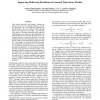Free Online Productivity Tools
i2Speak
i2Symbol
i2OCR
iTex2Img
iWeb2Print
iWeb2Shot
i2Type
iPdf2Split
iPdf2Merge
i2Bopomofo
i2Arabic
i2Style
i2Image
i2PDF
iLatex2Rtf
Sci2ools
AAAI
2015
2015
Improving Multi-Step Prediction of Learned Time Series Models
Most typical statistical and machine learning approaches to time series modeling optimize a singlestep prediction error. In multiple-step simulation, the learned model is iteratively applied, feeding through the previous output as its new input. Any such predictor however, inevitably introduces errors, and these compounding errors change the input distribution for future prediction steps, breaking the train-test i.i.d assumption common in supervised learning. We present an approach that reuses training data to make a no-regret learner robust to errors made during multi-step prediction. Our insight is to formulate the problem as imitation learning; the training data serves as a “demonstrator” by providing corrections for the errors made during multi-step prediction. By this reduction of multistep time series prediction to imitation learning, we establish theoretically a strong performance guarantee on the relation between training error and the multi-step prediction error. We prese...
Related Content
| Added | 27 Mar 2016 |
| Updated | 27 Mar 2016 |
| Type | Journal |
| Year | 2015 |
| Where | AAAI |
| Authors | Arun Venkatraman, Martial Hebert, J. Andrew Bagnell |
Comments (0)

